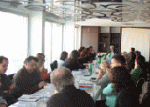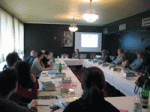Monitoring the implementation of human rights obligations of the State is one of the main activities of the Belgrade Centre for Human Rights. The Centre monitors and reports on respect for human rights in our country, most notably through its annual human rights report, in which it analyses national human rights legislation and its compatibility with international standards in the field, above all with the European Convention on Human Rights and Fundamental Freedoms, the International Covenant on Civil and Political Rights and the International Covenant on Economic, Social and Cultural Rights. The reports also give an overview of how the human rights are implemented in practice.The Centre is the coordinator of the project “MORE – Monitoring and Reporting About the Implementation of International Obligations (NGOs capacity building)” funded by the Delegation of the European Union to the Republic of Serbia. The aim of the project, which the Centre is implementing in co-operation with the Child Rights Centre and the Legal-Informational Centre for Non-governmental Organisations (PIC), is to establish a network of non-governmental organisations from the whole country, in order to build a capacity to monitor implementation of human rights obligations at the local level. A series of seminars will be organised with that aim in 4 towns in Serbia, in order to train the representatives of local NGOs to monitor and to report on respect for human rights in their communities. Interested local NGOs will write short reports on how certain rights are implemented in practice. The Centre will make a comprehensive report on human rights in our country, based on the reports of local NGOs and its own research. The report on the rights of the child will be prepared by the Child Rights Centre, in co-operation with local partners.
The project “MORE – Monitoring and Reporting About the Implementation of International Obligations (NGOs capacity building)” aims at establishing a network of non-governmental organisations which would report on respect for human rights in Serbia. The co-ordinators of the reporting process will be the Belgrade Centre for Human Rights and the Child Rights Centre. The Belgrade Centre, as the project co-ordinator, has signed a Memorandum of Understanding with other interested non-governmental organisations.
Seminars for representatives of local NGOs and social care centres were organised in Niš, Užice, Novi Pazar and Novi Sad. Two seminars were held in each town, one organised by the Belgrade Centre for Human Rights and the other by the Child Rights Centre. Seminars organised by the Belgrade Centre dealt with more general topics, such as implementation of international treaties, human rights mechanisms of the United Nations and of the Council of Europe, execution of decisions of international bodies, right to effective legal remedy, prohibition of discrimination, right to fair trial, prohibition of torture, right to life, while the seminars of the Child Rights Centre were focused on the rights of the child.
The Belgrade Centre’s seminar in Niš was held on 8-10 April, and the Child Rights Centre’s seminar on 28-29 May. Both seminars were held in Aleksandar Hotel. Participants were representatives of nongovernmental organisations from Niš, Vranje, Negotin and Aleksinac.
 |
 |
The seminar of the Belgrade Centre for representatives of nongovernmental organisations, social care centres and Ministry of Education from Užice, Prijepolje, Trstenik and Požega was held on Zlatibor mountain, in Olimp Hotel, on 27-29 May. The seminar organised by the Child Rights Centre took place on 17-19 June.
The Belgrade Centre’s seminar in Novi Pazar was held on 4-6 October in Hotel Tadž, while the Child Rights Centre’s seminar was organised on 1-2 November. Participants in both seminars were representatives of nongovernmental organisations and social care centres from Novi Pazar, Sjenica and Priboj.
Child Rights Centre’s seminar in Novi Sad was held on 28-30 March in Hotel Novi Sad, while the Belgrade Centre’s seminar was held on 7-9 April in Hotel Sajam. Participants were representatives of social care centres and nongovernmental organisations from Novi Sad, Kula, Ada, Plandište, Inđija, Zrenjanin, Pančevo, Subotica and Belgrade.
 |
 |







